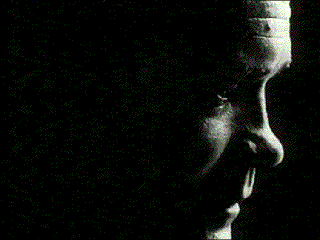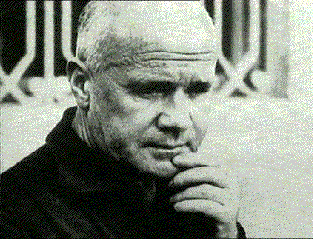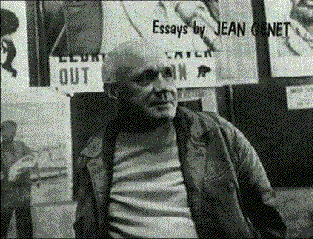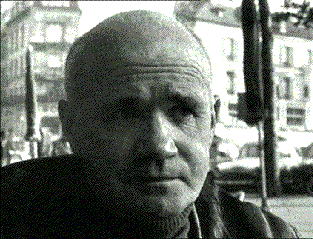 | "the difficulty of principle is that there is no unity of occurrence: fixed form, identifiable theme, determinable elements as such. Only anthemes, scattered throughout, gathered up everywhere. If, for example, the machine only selected words or themes, it could draw them all into a net of three, three and a half pages:" (208bi) |
| "I give you - a pure gift, without exchange, without return - but whether I want this or not, the gift guards itself, keeps itself, and from then on you must owe, tu dois. In order that the gift guard itself, you must owe. You must at least receive it, already know it, recognize or acknowledge it. The exchange has begun even if the countergift only gives the receiving of the gift." (243a) |  |
"First of all: two columns."
Remains of Glas
a partir de Jacques Derrida
| "Sa signature, comme la pensée du reste, enveloppera ce corpus mais n'y sera sans doute pas comprise. Ceci est - une légende." (1a) | "Of the remain(s), after all, there are, always, overlapping each other, two functions. The first assures, guards, assimilates, interiorizes, idealizes, relieves the fall into the monument... The other - lets the remain(s) fall. Running the risk of coming down into the same. Falls (to the tomb[stone]) -"(1b) |
| "What always remains irresoluble, impracticable, non-normal, or non-normalizable is what interests and constrains us here. Without paralyzing us but while forcing us on the course [de-marche]: zigzagging, oblique to boot, jostled by the bank [rive] to be avoided, like a machine during a difficult maneuver." (5a) |  |
| "The dialectic of language, of the tongue [langue], is dialectophagy." (9a) | "Il n'y a pas de présent plus pur, de générosité plus inaugurale. Mais don de rien, d'aucune chose, tel don s'approprie violemment, il harponne, arraisonne ce qu'il paraît engrendrer, il pénètre et paralyse d'un coup le donataire ainsi consacré." (12b) |
| "La bonne conscience (gute Gewissen) maintient le cercle de l'échange. Je reprends d'une main ce que je donne de l'autre, chaque main tient le registre de l'autre, maîtrise et annule la différence entre les deux opérations. Calcul supérieur et sans reste: ce que veut être la conscience." (71a) | "A graft does not supervene upon the proper. The proper begins with finding in the graft its bursting: its appearing or its blowing, but also its morseling." (34b) |
 | "Who dreams? Whom? Who writes? What? Who signs the miracle of the red rose? Who signs under this text that no less has its period, its rules? Will there be bleeding? The question can be left suspended for a while at least. The risk is to die before having written one's glas." (61b) |
| "Thus: spirit is. Alone. Its contrary, matter, is only inasmuch as it is not what it is, inasmuch as, in order to be what it is (falling weight and the tendency of dispersion to unity), it becomes what it is not: spirit. Spirit is. Alone. Being is being (close) by self. Weight and dispersion, the essence of matter, could not qualify an essence. Matter has no essence; its esence is its contrary, its essence is not having an essence. Dispersion, like weight (nonunity and non-ideality), has no essence. Thus is not. Being is idea." (23a) | "Why make a knife pass between two texts? Why, at least, write two texts at once? What scene is being played? What is desired? In other words, what is there to be afraid of? who is afraid? of whom? There is a wish to make writing ungraspable, of course. When your head is full of the matters here you are reminded that the law of the text is in the other, and so on endlessly. By knocking up the margin - (no) more margin, (no) more frame - one annuls it, blurs the line, takes back from you the standard rule that would enable you to delimit, to cut up, to dominate. You are no longer let know where the head of this discourse is, or the body, the neck is dissimulated from you so that you cannot bear your own." (64b) |
| "Im Anfang war der Logos, voilà ce qui intéresse Hegel. Parmi les quatre Évangiles, celui dont il s'occupe le plus, le plus philosophiquement, le plus dialectiquement, reste à part. Le texte écrit original, le seul que nous possédions, avec ses marques d'hellénisme (de philonisme ou d'hermétisme) pose toute sorte de problèmes mes aux philologues et aux exégètes.tes. Ces traits helléniques sont-ils accidentels, prophétiques ou essentiels? Ce problème me de lecture ne peut se déployer que sur une scène ne familiale." (88a) | "Le glas n'est de personne. Personne. Il n'annonce ni ne rappelle rien." (92b) |
| "I make me (the) present. In view of whom? The useless, the specious, the frivolous do not escape the contractual concatenation; on the contrary they engage in it, immediately place in it the debit, the must [le doit]. To make themselves cadeau." (244a) | "Save subsequent verification with the help of thesis-reading or -writing machines, the case of such an interpolation (not truly an interpolation, being monstrous at least in size and beauty) seems rare. It is not one of those settings en abyme through which the author feigns to intervene, as an author, in a narrative account, so as to play at explaining his labor to you while he is in the act of making you swallow something else that you do not yet see, that you do not even have the time to linger behind to recognize." (124b) |
 | "It is not enough to be crafty, a general theory of the ruse that would be part of it must be available. Which comes down to making a confession, unconscious, to be sure. The unconscious is something very theoretical. If I write two texts at once, you will not be able to castrate me. If I delinearize, I erect. But at the same time I divide my act and my desire. I - mark(s) the division, and always escaping you, I simulate unceasingly and take my pleasure nowhere. I castrate myself - I remain(s) myself thus -- and I 'play at coming' [je 'joue à jouir']. Finally almost." (65b) |
| "The Aufhebung is not some determinate thing, or a formal structure whose undifferentiated generality applies itself to every moment. The Aufhebung is history, the becoming of its own proper presentation, of its own proper differentiating determination, and it is subject to the law, to the same law as what it is the law of: it first gives itself as immediate, then mediatizes itself by denying itself, and so on. That it is subject to the law of what it is the law of, that is what gives to the structure of the Hegelian system a very twisted form so difficult to grasp." (121a) | "The morsels, which I cut [coupe] and sew [couds] in the text designated by the one named Genet, must neither destroy its form or quash its (prompting) breath (do not say its unity, the question posed here being one of knowing whether a text could be one and if such a thing exists any more than a unicorn), nor recompose or recapture [ressaisir] its integrity in one of those nets - formal or semantic - that we have feigned to throw and rethrow without counting: only in order to show or rather to draw beyond any manifestation that the net operates only insofar as it is beholden to a remain(s)." (169b) |
| "So it is not certain that something more or different from Hegel is being said, that something more or different from what he himself read is being read when the word castration and other similar things are put forward. It is not certain that one conceptually intervenes in his logic. To do that, one would have to displace conceptually the conceptual articulation - for him manifest - between Aufhebung, castration, truth, law, and so on. Forces resistant to the Aufhebung, to the process of truth, to speculative negativity must me made to appear, and as well that these forces of resistance do not constitute in their turn relievable or relieving negativities. In sum a remain(s) that may not be without being nothingness: a remains that may (not) be." (43a) | "There is a whole 'theory' of the event here - by theory I understand *theater* of course - sewn from the filial filaments, and a whole theory of the immemorial as well. But theory - always blind on this point - seduces us less than the event that slips away unravelling, in the studio, in the texts, in the scene, on the stage." (80b) |
| "This structure - discontinuous jump, breaking-in and allayed stay in a form open to its own proper negativity - has no outer limit." (107a) | "The object of the present work, and its style too, is the morsel. Which is always detached, as its name indicates and so that you don't forget it, by the teeth. Insofar as it cannot, naturally, bind (band) itself (erect). Graft itself at the very most, that it can still do." (118b) |
 | "I have no intention of accounting for this, not because I keep the reason for it to myself, but rather -- since it has to do with grafting in any case and in every sense - because the principle of reason perhaps is no longer in use. At least the reason cannot be asked of the one who writes. So the operation would consist, for the moment, of merely carrying away the graft of the paranthetic organ, without knowing whether that bleeds or not, and then - after the removal and a certain treatment that above all does not consist in curing - to put back in place, to sew up again, the whole perhaps not growing quiet in its restored constitution, but on the contrary being slashed to pieces more than ever." (124-25b) |
| "Between the two lives, as their hyphen [trait d'union], their contract or contraction - death. But also the space of metaphoric play and the analogy that interests us here under the title of [au titre de] filiation." (82a) | "The moment you think you are reading it here, commenting on or deciphering this text here, you are commented on, deciphered, observed by an other: what remained. There is - always - already - more than one - glas. Glas must be read as 'singular plural' (fall of the or [gold, now] in the double session). It has its breaking in itself. It affects itself and immediately resounds with this literal damage." (150b) |
| "Knowledge, truth (of the) phantasm (of) (absolute) philosophy-(absolute) religion, this proposition delineates no limit, is the infinite proposition of hetero-tautological speculative dialectics. The infinite circle of auto-insemination that entrains the paideia of every seminar in(to) its phantasm. What can there be outside an absolute phantasm? What can one yet add to it? Why and how does one desire to get out of it?" (225a) | "But absolute knowledge, like (the) 'jalousie', is only a piece of the machinery, a running-effect [un effet de marche]" (225b) |
| "The question of the family, and then of religion, is pos(it)ed thus in the preamble; the family is at home only in time - in which reason has not absolutely reappropriated itself, has not found itself (close) by itself in its absolute familiarity, in which it does not yet dwell. Crossing the vestibule - family, religion - is the passage from the pro-position to the philosophical position that is the truth. Philosophical truth says: I am always following [suis] family and religion." (96a) | "...every thesis is (bands erect) a prosthesis; what affords reading affords reading by citations (necessarily truncated clippings, repetitions, suctions, sections, suspensions, selections, stitchings, scarrings, grafts, pastiches, organs without their own proper body covered with cuts, traversed by lice). Thus does a text become infatuated. With another. This does not happen without profit or loss for the organism that undergoes grafting after having been solicited, collared." (168b) |
| | "Unwearying, the labor [labeur] to reconstitute the glorious and integral corpus of a proprietorship, in the authentic and organless signature, will not have failed, always, in the end (will have some sein): what set sit in motion, its first thief [voleur], volens nolens, what causes writing, is what separates [écarte] and sows [et sème], scatters [essaime] signacutting and signacouture [signacoupure et signacouture]. What desingularizes, unseals, desiglums, opens the eyes by blinding." (171b) |
| "Et pourtant il y a de la pierre. Que veut-dire il y a dès lors que l'on soustrait ce qu'il y a au c'est, à ceci est, à l'ostention de toute présence? A propos du procès de propriation (Ereignis), Heidegger libère le es gibt, dans es gibt Sein, de la précession toute-pouissante de l'être. La valeur du don (Gabe), étrangère au il y a, gageons qu'elle aura tout préoccupée." (188a) | "on ne touche pas au glas, donc, sans toucher à la classe. Ni à l'économie de l'anthérection sans lutte des classes. Mais le discours codé, policé, sur la lutte des classes, s'il forclôt la question du glas (tout ce qui s'y forge, tout ce sur quoi elle retentit, en particulier l'expropriation du nom partout où elle porte) manque au moins une révolution. Et qu'est-ce qu'une révolution qui ne s'attaque pas au nom propre? Mais aussi bien qu'est-ce que la révolution si le nom propre (effet de glassification) - déjà - s'anthérige, commence donc par tomber en ruine? Des révolutions" (232bi) |
| "The rare force of the text is that you cannot catch (and therefore limit it to) saying: this is that, or, what comes down to the same thing, this has a relation of apophantic or apocalyptic unveiling, a determinable semiotic or rhetorical relation with that, this is the subject, this is not the subject, this is the same, this is the other, this text here, this corpus here. There is always some question of yet something else. Rare force." (198-99a) | "Is this heterogeneity of the interdict heterogeneous to the general (thus homogeneous) heterogeneity of the whole set of the ontological system? Can one ever speak of a general heterogeneity? Does the interdictory repression only introduce a flection of heterogeneity in addition (a reflection of the alterity)? Or else a heterogeneity that no longer lets itself be interned in a reflection? Since the concept of general heterogeneity is as impossible as its contrary, such a question cannot pose itself. The question's posit(ion)ing is the question's annulment." (198-199b) |
| "Here again I do nothing other, can do nothing other, than cite, as you perhaps have just seen: only to displace the syntactic arrangement around a real or sham physical wound that draws attention to and makes the other be forgotten." (215b) |
| "In these very subtle cases, then, the structure, the construction (Aufbau) of the fetish rests at once on the denial and on the affirmation (Behauptung), the assertion or the assumption of castration. This at-once, the in-the-same-stroke, the du-même-coup of the two contaries, of the two opposite operations, prohibits cutting through to a decision wihin the undecidable. This at-once constitutes an economy of the undeciable: not that the undecidable interrupts there the efficacy of the economic principle. The at-once puts itself in the service of a general economy whose field must then be opened. There is an economic speculation on the undecidable. This speculation is not dialectical, but plays with the dialectical. The feint consists in pretending to lose, to castrate oneself, to kill oneself in order to cut cut [couper] death off. But the feint does not cut it off. One loses on both sides, in both registers, in knowing how to play all sides [sur les deux tableaux]." (210a) | "Why cut off here?" (214b) |
 | "Reste ici ou glas qu'on ne peut arrêter. Que quelque double entrave. Aprés la mort de Divine, les obsèues sont donc réglées par l'abbé qui concentre sur lui tous les désirs. C'est un travesti qui s'y connaît en effractions et en éventrations. Tous les mots suivent en silence jusqu'á la dispersion complète de la théorie et du dit séminaire. Effritement, défroque, fards et fleurs." (287b) |
| "If the gravity and the dispersion of matter to the outside are analysed, one should recognize there a tendency, an effort tending towards unity and the gathering of self. A tendency toward the center and unity, matter then is spirit's opposite only inasmuch as it remains resistant to its own tendency. But to be opposed to its own tendency, to itself, to matter, it must be spirit. And if it yields to its tendency, it is still spirit." (22a) | "So this mascarade (somewhere he defines femininity with this word), a carnival between two counter-pointed parantheses, faces at once the East and the West, land and sea, the rising and the setting of the sun. The whole world bands erect and is incorporated in the transvestite, all kinds and genders of opposition, the sun and fish on one side, the sea and night on the other." (246b) |
| "Le texte est grappu. L'ersatz, dit-il, ce n'est pas bien." (242b)
| "tout revient à vivre au crochet d'un manchot; la grappe, le grappin sont une sorte de matrice crochue. "Grappe, E. Picard et champ. crape; provenç. grapa, crochet; espagn. grapo, crochet; ital. grappo, crochet, bas-lat. grapa, grappa, dans les Addenda de Quicherat; de l'an. haut allem. chrapfo, crochet, allem. mod. Krappen; comp. le kymry crap. La grappe a été ainsi dite parce qu'elle a quelque chose de crochu, d'accroché" (Littré)" (242bi) |
| "The petroglyph remains outside consciousness. Its antithesis, the hymn, immediately disappears, like the voice, the very moment it is produced. Like time, it is no longer there straightaway, immediately, as soon as it is there, inasmuch as it is there (wie die Zeit, unmittelbar nicht mehr da, indem sie da ist). The Da is posited inasmuch as it withdraws. In its counter-time [contre-temps]. Abstract art is made of this double one-sidedness: spatial nonmovement and temporal movement, the double loss of the divine figure, plastic art and lyric art." (259a) | "It grates. Rolls on the tree trunks lying down. Pulleys. The greased ropes grow taut, they are all you hear, and the breathing of slaves bent double. Good for pulling. Proofs ready for printing. The cracking whip of the foreman. A regaining of bound force. The thing is oblique. It forms an angle already with the ground. Slowly bites again its shadow, dead sure (death) of (it)self. So little (phallus) would have been necessary, the slightest error of calculation, they say distyle, if it falls (to the tomb), if it is inclined and clines towards the other's bed, the machine is still too simple, the pre-capitalist mode of writing." (262b) |
| "Mais une fois de plus, mouvement de balance, tout se fixe dans l'objectivité extérieure qu'on a opposée à l'embrasement dionysiaque. On a deux morceaux opposés qui se contredisent dans leur unilateralité respective. L'équilibre (Gleichgewicht) est sans cesse rompu. Dans le délire, le soi-même (Selbst) perd connaissance; sur le stade, c'est l'ésprit qui est hors de lui-même. (262a) | "Ce que j'avais redouté, naturellement, déjà, se réédite. Aujourd'hui, ici, maintenant, le debris de" (262b) |
Bibliography | Blurbs | Beginnings | Forthcoming | Sussex | Thanks ]
